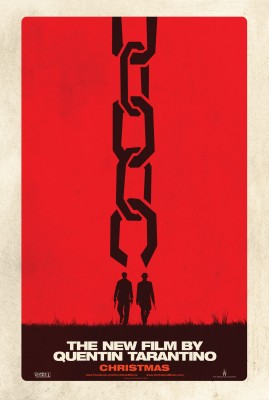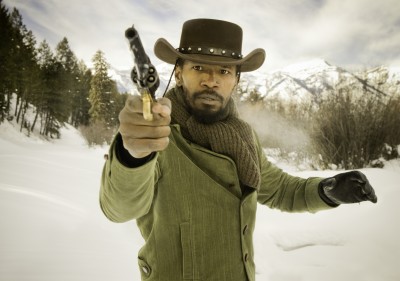Django Unchained…But Is Tarantino?
Many years ago, I was introduced to Quentin Tarantino’s films by my good friend and fellow filmmaker John Foutz. Turned out, John helped Mr. Tarantino gain another admirer, and I am enough of a fan that I have seen all of the feature films he has directed. In good “I admire a director” fashion, Mike and I went to see Tarantino’s most recent venture Django Unchained last night with our good friend Adam, and I refrained from reading reviews or commentaries related to the film since I wanted to experience and respond to the film on my own first.
Having now done so, I did read other reviews today and am well aware of the criticism the film is receiving based on a statement Tarantino made regarding Roots and historical accuracy. That said, I do not intend to focus on historical accuracy. While I have studied American Slavery enough to know of atrocities that could make the Spanish Inquisitors of old squirm, I do not have the expertise to make any authoritative statements or claims on these weighty matters, so I will leave that to those who do. To hear some of these arguments, please reference my friend, writer, and filmmaker Professor Loc’s review. He is gifted with asking questions that make you think.

So, we went, we watched, we experienced, and we departed after all credits had rolled. All in all, I enjoyed the film. That said, it is not one of my Tarantino favorites, and I do not believe it is one of his best. So, let’s discuss Django Unchained within the collected works of Tarantino.
In my opinion, three characteristics are hallmarks of Tarantino films – 1) Violence and lots of it, 2) Language that would make most of our mothers blush and perhaps yell at the screen, “Didn’t your mother teach you better than that?!”, and 3) Witty, catching, intelligent dialogue that is often like watching two martial arts masters duel. Audiences have come to expect this of Tarantino, and the squeamish should (and most likely do) avoid his films. For those of us who are not put off, they entertain because they contain extremely high shock value, and there’s still that little part of us that get a thrill out of watching something of which Mom might not approve.
So here is a trend I have observed – if I can call it that by comparing three films – Tarantino seems to be getting more extreme with violence and language in each new film. And for me, these two hallmarks are beginning to get in his way. While Kill Bill (I & II) was violent and gruesome, it did not seem as much so as Inglorious Bastards. At times, I felt the violence in that film was distracting and didn’t enjoy it nearly as much as Kill Bill, but after last night, Django Unchained now takes the violence prize. This time, I believe part of what puts me off is the density of the violence rather than its presence. Other than a striking scene in which Django (Jamie Foxx) practices with a revolver, twirling it like a true gunslinger, all the action scenes in Django Unchained are violence scenes. Not so with Kill Bill, in which we have chase scenes and training scenes that while active don’t involve killing. Nor with Deathproof, in which Zoe Bell straps herself to a Dodge Challenger hood as it is barreling down the road. Now, it’s very possible that, at nearly three hours, the length of the film is influencing my perception of how dense the violence is. I don’t believe I have ever heard the N-word as much as I did last night, and when I say ever, I mean the sum of all times. And though I’m sure adult language was used, I honestly don’t remember it. Here’s the shock value in force. And, as a Tarantino fan, you probably have gathered that I’m not a squeamish audience member. Since each film seems to have this increased level of violence and language, where does it end? When will audience members go “Okay…that’s it. You’ve overdone it”? I understand the artist’s plight of being locked into a specific genre or formula. Look at what happened to M. Night Shyamalan when he tried to veer away from his plot twist ending. Everyone hated him for it, but they also hated on him for continuing to plot twist. Tarantino may well battle (or soon battle) the same type of predicament. Of course, a director venturing away from his/her hallmarks is always risky, and I do hope that, when Tarantino decides to do something dramatically different, it will be a smooth transition and well received.

Django Unchained is incredibly long and could have been cut significantly. Another of my favorite Tarantino films Deathproof (his half of Grindhouse) is very short. It has all of the components of a great Tarantino film packed into about 45 minutes, so it‘s obvious that Tarantino can be succinct. I’m not sure why he chose to make Django so very long. It didn’t help that Mike and I drank a giant Coke in the theater and had just come from a dinner of Pho with a pot of hot green tea to drink. I did have to leave for a couple minutes, as sitting through the movie in this condition would have lead to a most embarrassing accident. I chose the moment when the audience first saw all (and I do mean ALL) of Jaime Foxx. I decided then was a good a time as any.
So what were the strengths of the film? Beautiful cinematography reminiscent of old Hollywood westerns, excellent acting by Leonardo DiCaprio (I really hated Candie and cheered when he got his), and solid dialogue battles between Candie and Django punctuated by Jamie Foxx’s short, confident delivery that called bullshit on disreputable characters. Let’s also breath a relieved sigh. This is not another remake. In short, if you are a Tarantino fan, see this movie for yourself. If you are unfamiliar with Tarantino’s work, try Kill Bill I & II or Reservoir Dogs to experience Tarantino’s finest then proceed to his others if you’re not put off by these.
Leave a Reply